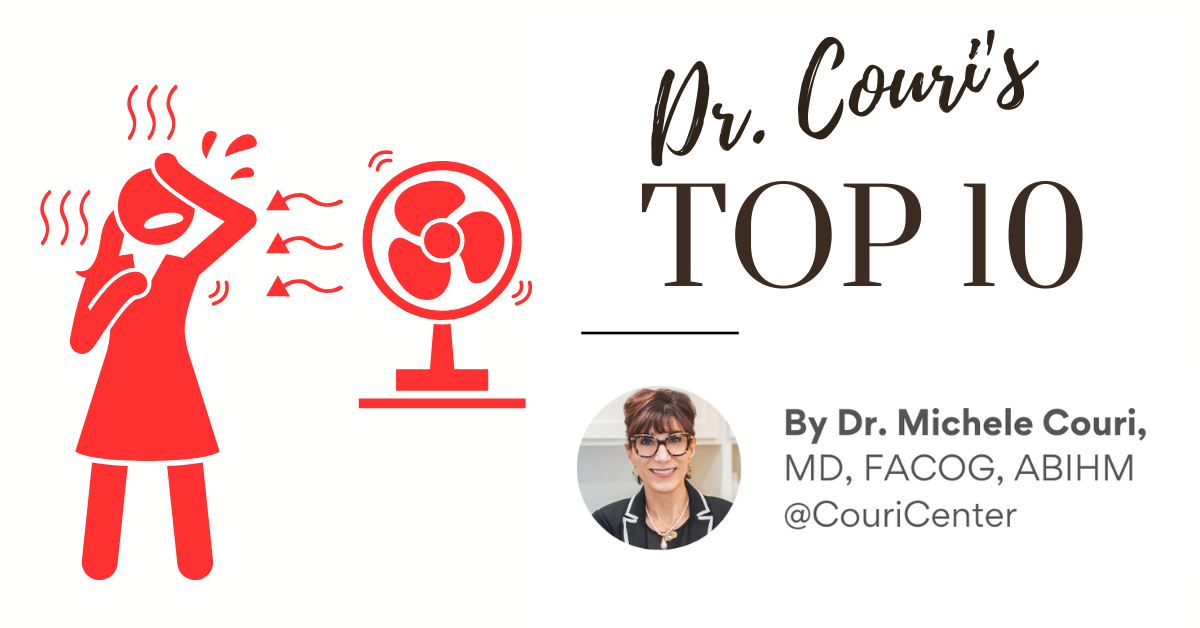
Summary
Dr. Couri became familiar with fezolinetant at the European Menopause Society's Clinical Meeting and is excited to offer it as an alternative for patients who cannot undergo estrogen replacement. She encourages interested individuals to schedule an appointment with their providers to learn more about fezolinetant and determine if it is a suitable treatment option.
Ten Facts about Menopausal Hot Flashes & Night Sweats
By Dr. Michele Couri, MD, FACOG, ABIHM, @couricenter
- 70% of women during the menopausal transition experience hot flashes and night sweats (vasomotor symptoms).
- In fact, 34% of women in the U.S. report moderate to severe vasomotor symptoms, enough to significantly diminish quality of life.
- Hot flashes and night sweats can cause sleep disruption with resultant fatigue and cognitive impairment, mood changes, anxiety, and work-related difficulties, and unfortunately, may persist for 7-10 years or longer.
- In addition to the bothersome side effects, hot flashes and night sweats have also been found to be an independent risk factor for cardiovascular disease.
- Estrogen replacement has been proven to be the most effective treatment for vasomotor symptoms and has been used worldwide to improve women’s quality of life for decades.
- Not all women are candidates for menopausal estrogen replacement, and we have historically relied on over-the-counter and prescription non-hormonal options to help these women.
- We now have an FDA-approved NON-HORMONAL medication specifically for hot flashes and night sweats, and its name is Veozah (fezolinetant).
- Fezolinetant is the first and only selective neurokinin 3 (NK3) receptor antagonist to help reduce heat signals that trigger hot flashes and night sweats.
- In the studies, patients taking fezolinetant reported 63% fewer hot flashes compared to those patients taking a placebo. In addition, fezolinetant reduced the severity of the vasomotor symptoms as well.
- Fezolinetant has been found to improve vasomotor symptom frequency and severity by week one, and there was no evidence of loss of effect through 52 weeks.
When patients are not candidates for estrogen to combat vasomotor symptoms, it is exciting now to have an effective non-hormonal option specifically designed for these women. I first heard about fezolinetant in May when I attended the European Menopause Society’s Clinical Meeting in Florence, Italy. I was so excited to learn about this medication as an option for so many of our patients who cannot use estrogen. Shortly after I returned from this conference, fezolinetant became FDA-approved here in the U.S. We now have another effective and safe tool in our toolbox to help menopausal women achieve their best quality of life and improve their health outcomes. To learn more about fezolinetant or to find out if you are a candidate for this medication, please schedule an appointment with one of our providers.
To Your Health,
Dr. Couri
DISCLAIMER: We have no financial interest in this drug. The information provided on this website is intended for general informational purposes only and is not intended to be a substitute for professional medical advice, diagnosis, or treatment. The information provided is current as of the date of publication or last review, but medical knowledge is constantly evolving, and the information may become outdated over time.
References:
- Neal-Perry G, et al. Safety of Fezolinetant for Vasomotor Symptoms Associated With Menopause: A Randomized Controlled Trial. Obstet Gynecol. 2023 Apr 1;141(4):737-747.
- Veozah package insert. Northbrook, IL. Astellas Pharma US, Inc.
- Thurston, RC, et al. Menopause Practice: A Clinician’s Guide. 6th ed. The North American Menopause Society, 2019; 43-55.
- Depypere, H, et al. Expert Opin Investig Drugs 2021;30(7):681-94.
- Johnson, Ka, et al. J Clin Endocrinol Metab (Epub) 02-03-2023.
- Jayasena, CN, et al. Sci Rep (Epub) 02-16-2015.
- Lederman, S, et al. Lancet (Epub) 03-13-2023.
- ClinicalTrials.gov NCT04003155 08-15-2022
- ClinicalTrials.gov NCT04003142 08-15-2022.
